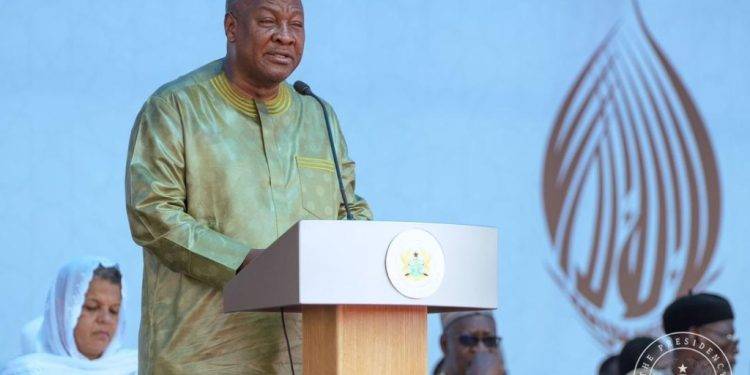President John Dramani Mahama has issued a decisive directive to suspend all ongoing and pending transactions involving state and public lands. This bold move, announced through a statement by Dr. Callistus Mahama, Secretary to the President, on January 10, 2025, seeks to safeguard the nation’s resources for the benefit of its people and future generations.
The president’s directive comes amidst growing public concern over the management and use of state-owned lands, with many calling for greater transparency and accountability. The statement emphasized that the directive applies to the sale, lease, or any processing of transactions related to state lands. The Lands Commission, tasked with overseeing these resources, has been ordered to immediately comply with the new directive and submit a detailed report on all recent and ongoing transactions within 14 days.
Protecting National Assets
This unprecedented move underscores President Mahama’s commitment to ensuring that state lands are preserved for public use and development rather than being mismanaged or sold for private gain. The president’s directive signals a broader intention to reform the governance framework surrounding state lands, ensuring they are utilized to support national growth and development initiatives.
State lands in Ghana, often located in prime areas, have historically been a contentious issue. Allegations of corruption, unauthorized sales, and the lack of transparency in land transactions have plagued the Lands Commission and other regulatory bodies. This directive marks a critical step towards addressing these issues and restoring public confidence in the system.
Immediate Actions Required
The Executive Secretary of the Lands Commission has been tasked with halting all transactions without exception. The directive requires a comprehensive audit of all dealings, including those already underway and those pending approval. This review will form the basis for a new framework to guide the management and allocation of state and public lands moving forward.
The president’s directive also calls for collaboration among key stakeholders, including the Ministry of Lands and Natural Resources, to ensure the effectiveness of the review process. By mandating transparency and accountability, this move is expected to curb irregularities and ensure that state lands are used for the collective good.
The Broader Implications
The decision has sparked significant public interest and debate. Many have lauded the president for taking a firm stance on protecting state resources, viewing the directive as a necessary step to prevent further exploitation. Civil society organizations and advocacy groups have expressed optimism that the move will lead to a more equitable and sustainable use of state lands.
Others, however, have raised questions about the implementation of the directive, particularly its impact on ongoing projects and transactions. There are concerns about potential delays and disruptions to development initiatives that rely on state land allocations. Addressing these challenges will require effective communication and coordination between the government and affected stakeholders.
A History of Controversy
The management of state lands in Ghana has been a longstanding issue, with accusations of mismanagement and corruption frequently making headlines. Reports of prime public lands being sold at undervalued prices to private entities have fueled public outrage and eroded trust in the system.
In recent years, the issue has been further complicated by urbanization and population growth, which have increased the demand for land in major cities. The resulting pressure on state lands has highlighted the need for a robust regulatory framework to ensure fair and efficient allocation.
President Mahama’s directive is widely seen as a response to these challenges, signaling a shift towards greater accountability and responsible governance. By halting all transactions and initiating a comprehensive review, the president aims to address the root causes of the problem and prevent further misuse of public resources.
Stakeholders React
The directive has drawn mixed reactions from various quarters. Advocacy groups and policy analysts have praised the move as a step in the right direction, calling for swift and decisive action to implement the president’s vision.
“We welcome this directive as a necessary measure to protect Ghana’s valuable resources,†said a spokesperson for the Coalition for Land Rights and Governance. “State lands belong to the people, and their management must reflect the principles of transparency and accountability.â€
However, some industry players have expressed concerns about the potential impact on development projects and investment. Developers and contractors who rely on state land allocations for their projects may face delays and uncertainties as the review process unfolds.
Looking Ahead
As the 14-day deadline approaches, all eyes are on the Lands Commission and other stakeholders to deliver a comprehensive report on the status of state land transactions. The findings of this review will be critical in shaping the future management of public lands and ensuring that they serve the collective interests of Ghanaians.
The directive also presents an opportunity for broader reforms in land governance. By addressing the systemic issues that have plagued the management of state lands, the government can pave the way for a more equitable and sustainable approach to resource allocation.
President Mahama’s bold decision to halt state land transactions sends a clear message about his administration’s priorities. By putting the public interest first and taking decisive action to protect national assets, the president is setting a precedent for responsible governance and accountability.
As the nation awaits the outcome of the review process, the directive stands as a testament to the importance of preserving public resources for the benefit of all Ghanaians. Whether this move will lead to lasting change remains to be seen, but it undoubtedly marks a significant step towards a more transparent and equitable system of land management.




No comments yet
Be the first to share your thoughts!